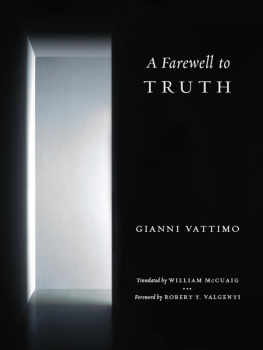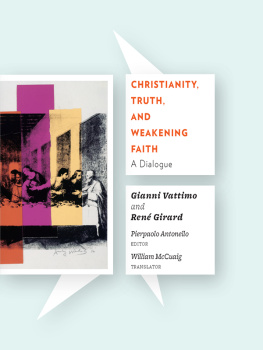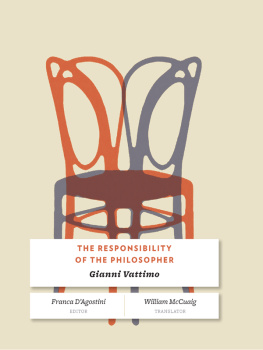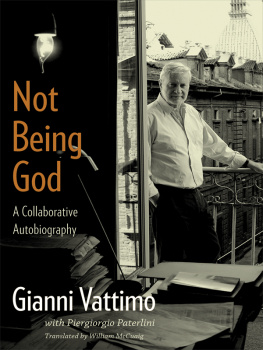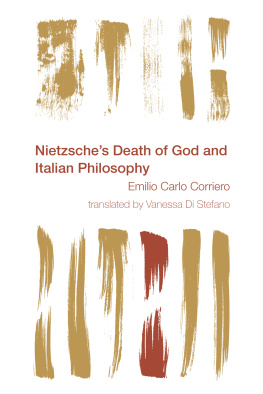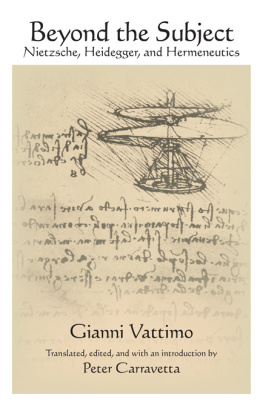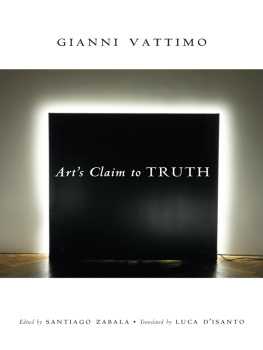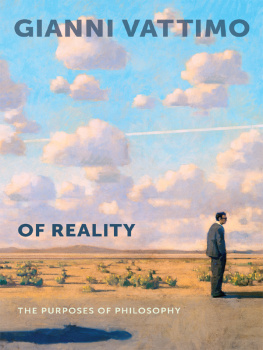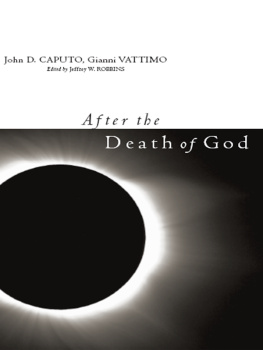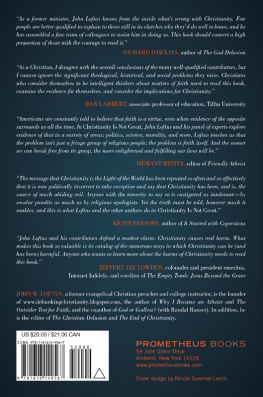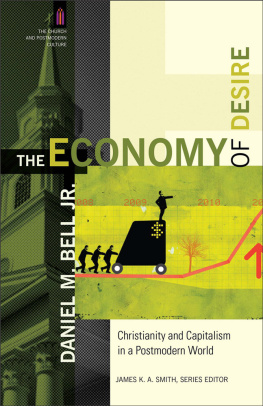After Christianity
Italian Academy Lectures
Italian Academy Lectures
UMBERTO ECO
Serendipities: Language and Lunacy
CARLO GINZBURG
No Island Is an Island: Four Glances at English Literature in a World Perspective
After Christianity
Gianni Vattimo
translated by Luca DIsanto
Columbia University Press New York
Columbia University Press
Publishers Since 1893
New York Chichester, West Sussex
cup.columbia.edu
Copyright 2002 Columbia University Press
All rights reserved
E-ISBN 978-0-231-50650-2
Library of Congress Cataloging-in-Publication Data
Vattimo, Gianni, 1936
After Christianity / by Gianni Vattimo; translated by Luca DIsanto.
p. cm.(Italian Academy lectures)
Includes index.
ISBN 0231106289 (cloth : alk. paper)
1. Christianity. I. Title. II. Series.
BR121.3 .V38 2002
230dc21
2001047502
A Columbia University Press E-book.
CUP would be pleased to hear about your reading experience with this e-book at .
, The West or Christianity, was first published in Italian as LOccident o la Cristianit, in the book Cristianesimo ed Europa (Citta Nuova, 1993).
Contents
THE ITALIAN TITLE of a recent book of mine, translated into English as Belief, was Credere di credere (believing that one believes). It was a difficult title to translate, though it contained the meaning I wanted to convey in the text. The expression believing that one believes sounds paradoxical in Italian, too: to believe means having faith, conviction, or certainty in something, but also to opinethat is, to think with a certain degree of uncertainty. To clarify the title, then, I would say that the first believing has the latter meaning, while the second use of the term has the sense of having faith, conviction, and certainty. It is rather difficult to put the two meanings of the verb together: if I merely opine, if I think, I hold with some probability that I have certainty and faith. This sounds unclear as well as suspicious.
However, this expressions meaning, unclear as it may be, seems to correspond to an experience that is widespread and comprehensible, and of which many of us are aware. As I say in my book, it came to mind one day while I was speaking on the telephoneindeed, on a public telephone set in an open space, in the midst of traffic and of chatting peoplewith an old professor of philosophy who was also a fervent believer. I had not seen him for a long time, and he asked me whether I still believed in God. I answered, Well, I believe that I believe. This is still my attitude today. Upon reflecting on that spontaneous response I came to understand, or I believe to have understood, that this unclear meaning of faith is entirely bound up with my experience as a scholar of philosophy, and perhaps as an intellectual belonging to this specific epoch, too. I say this without any presumption. On the contrary, I recognize that what I hold to be exemplary is such only in the sense in which people generally call an example something corresponding to a number of similar objects, a car of a certain type, or a statistical sample (which has nothing exceptional about it either).
Why, then, do I think I have understood that for those like me who have any familiarity with contemporary philosophy, but above all with postmodern life, religious belief can only have this meaning characterized by a deep uncertainty of opinion?
My itinerary toward the Christian faith, too, makes me a statistical sample, of which quite a few people who have had training similar to mine also are part. After World War II, when I was about ten years old, I used to go to the parish church, where I developed my basic attitudes toward the world and others, including my social, political, and religious interests. Indeed, it was to live up to this blend of interests that I decided to study philosophy at the university: I wanted to contribute to the formation of a new Christian humanism, which would be free from liberal individualism and from collective and deterministic Marxism. Those were the years when wethe Catholic youthstudied the works of Jacques Maritain, a distinguished neo-Thomistic and antifascist French thinker, who had written a book entitled Integral Humanism. I inherited from Maritain a diffidence toward certain dogmas of modernity. For this reason, after finishing my doctoral thesis on Aristotle, I became engrossed in the study of Nietzsche and Heidegger, who to me appeared to be the most radical critics of modernity. Now, it is precisely through these authors, who were not merely antimodern but also anti-Christian (especially Nietzsche), that I paradoxically was led back to the Christian faith, or to something that bears a striking resemblance to it.
Here I shall stop dwelling on my autobiography. Instead, I would like to explain my paradox of having recovered Christianityin the form of believing that I believethrough Nietzsche and Heidegger. Nietzsches announcement that God is dead is not an atheistic thesis like God does not exist. Nietzsche could not state a thesis like the nonexistence of God because the claim to its absolute truth would have to be upheld as a metaphysical principle, that is, as the true structure of reality, having the same function as the traditional God of metaphysics. Wherever there is an absolute, even if it is the sheer affirmation of the nonexistence of God, metaphysics is always present in the form of the supreme principle, namely the God whose superfluousness Nietzsche believes to have discovered. In sum, for Nietzsche God is dead means nothing else than the fact that there is no ultimate foundation. An analogous meaning, albeit unacknowledged, is found in Heideggers polemics against metaphysicsthe whole European philosophical tradition from Parmenides onwhich believes itself capable of grasping the ultimate foundation of reality in the form of an objective structure like an essence or a mathematical truth, which is given outside of time.
Just as Nietzsche cannot state that God does not exist (otherwise he would have to say that he knows the true structure of the real), Heidegger cannot dismiss metaphysics by stating that reality has a different structure, which is not objective but rather mobile. He would still be affirming another structure. Indeed, Heidegger dismisses the metaphysicalobjective, stable, and structuralconception of Being only in the name of an experience of freedom: if we exist (with our projects, hopes, aims, and fears) as finite beings who are not just appearance but rather beings who have a past and a future, then we cannot conceive of Being in accord with the objectivistic terms of metaphysics.
Actually, Heideggers denial of metaphysics articulates the attitude of a large part not only of philosophical thought but also of artistic, literary, and religious thought at the beginning of the twentieth century, when humanistic culture began to feel the need to rebel against the total organization of society (die totale Verwaltung in Adorno), which had increasingly imposed itself through the rationalization of labor and the triumph of technology.
For much of twentieth-century philosophy it is no longer possible to think of Being as foundation, not simply because of the risk that objectivism might lead to a totalitarian societyto Auschwitz or to the Gulagbut above all because European culture has become aware that there are other cultures that cannot be merely classified as primitive, that is, as lagging behind the West in the way of progress. The 1800s were the century in which the historical sciences, including cultural anthropology, arose: there was a ripe awareness that there was not just a single course of history (culminating in Western civilization) but different cultures and different histories. This awareness would be decisively advanced through the wars of liberation of the colonial nations. Algerias revolt against France as well as the petroleum war of the early 1970s were the last episodes within the theoretical, practical, and political rupture of Eurocentrism, i.e., of the idea of a unique human civilization of which Europe was conceived to be the leader as well as the apex.



